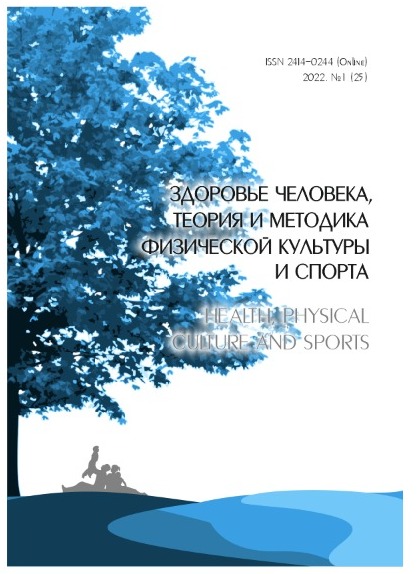Professional competencies of the teacher of physical culture and sports in the sphere of higher medical education
Abstract
The current relevance of the article is the increasing involvement of citizens of the Russian Federation of different age groups and health conditions in physical education and sports classes. Every year, the demand for highly qualified doctors, in particular, in the field of sports medicine, is increasing. Therefore, it is important for the training of quality medical personnel to identify professional competencies of teachers in physical education and sports in a higher educational medicalinstitution. In the work, a study of the professional competencies of a teacher on physical culture in a higher educational medical institution is carried out from the point of view of future doctors studying. Problems of perception of this discipline are raised depending on the course of study of medical students. As a result of the study, what personal qualities, scientific and methodological skills should be possessed by a professional teacher in physical culture and sports at a medical university. The research conducted by the authors of the article will help in the future to improve the quality of teaching the discipline of physical culture and sports, as well as the theoretical and practical training of medical students.
Downloads
References
Галкин В.А. Роль преподавателя по физической культуре в образовательном пространстве университета // Молодой ученый. 2015. № 9 (89).
Игнатьева А.М., Киселев Я.В. Проблема физической неподготовленности студентов первого курса // Актуальные проблемы физической культуры, спорта и здорового образа жизни на современном этапе : сборник статей X Международной научно-практической конференции. Нижний Новгород, 2020. С. 61–64.
Киселев Я.В., Быстрицкая Е.В., Григорьева Е.Л. К проблеме развития информационо-комунникативного компонента культуры здоровья у студентов медицинского вуза // Азимут научных исследований: педагогика и психология. 2020. Т. 9, №4 (33).
Кузнецова Н.А. Профессионально-педагогическая компетентность учителя физической культуры // Вестник Шадринского государственного педагогического института. 2013. № 3 (19).
Набойченко Е.С., Мехович Г.И., Кунышева С.Д., Гончарова Е.А. Повышение профессиональной компетенции преподавателя физической культуры в процессе формирования коммуникативных навыков // Актуальные проблемы психологического знания. 2016. № 3 (40). С. 117–123.
Рыжов В.В., Соколовская С.В. Формирование компетентности профессионала физкультурно-спортивной сферы // Современные проблемы науки и образования. 2020. № 4.
Серебровская Н.Е., Канатьев К.Н., Бочарин И.В., Дорошенко А.А. Новый взгляд на подготовку тренера в системе высшего профессионального образования // Актуальные вопросы физического воспитания молодежи и студенческого спорта : сборник трудов Всероссийской научно-практической конференции. 2020. С. 176–184.
Фролов В. В. Психологический портрет педагога по физической культуре и спорту: сравнительный анализ требований ФГОС и опрос экспертов // Ученые записки Университета им. П.Ф. Лесгафта. 2020. №8 (186).
Челнокова Е.А., Фролова Н.В., Терехина А. Е. Профессиональные компетенции преподавателя-тренера по физической культуре и спорту в высшей школе // Известия Балтийской государственной академии рыбопромыслового флота: психолого-педагогические науки. 2018. № 4 (46).
Черная Е.В., Захарова Н.А. Формирование профессиональных компетенций учителя по физической культуре // Вестник Южно-Уральского государственного гуманитарно-педагогического университета. 2020. № 4 (157).
Copyright (c) 2022 Health, physical culture and sports

This work is licensed under a Creative Commons Attribution-NonCommercial 4.0 International License.
An author should not normally publish manuscripts describing essentially the same research in multiple journals or publication venues. Such redundant publication is generally considered to constitute unethical publishing behavior, and if discovered may result in a manuscript under consideration being rejected, or a published article being retracted.
Authors of manuscripts reporting on original research should present an accurate account of the work performed, accompanied by an objective discussion of its significance. Underlying data should be represented accurately in the manuscript. The manuscript should contain sufficient detail and references to permit others to replicate the work. The fabrication of results and the making of fraudulent or knowingly inaccurate statements constitute unethical behavior and may be cause for rejection or retraction of a manuscript or published article.





